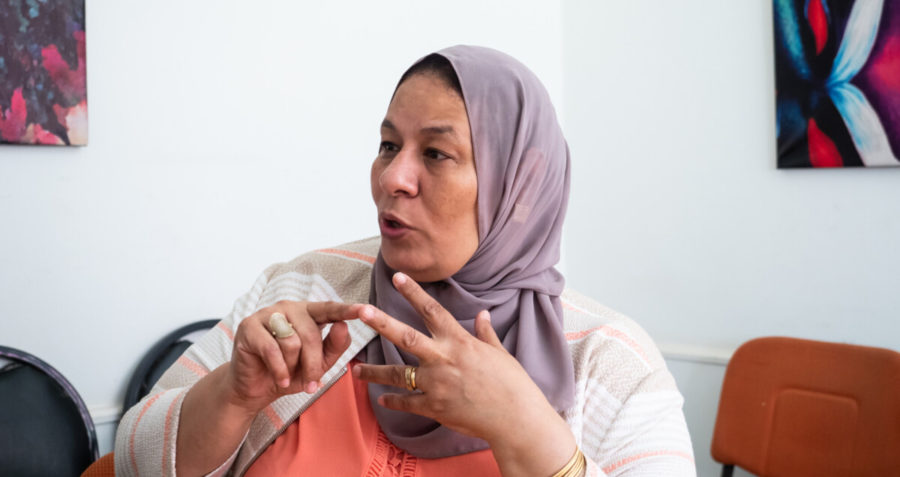Sustaining the HIV response for marginalised people in MENA
 2019 Gemma Taylor/Frontline AIDS
2019 Gemma Taylor/Frontline AIDS
The Alliance will be Principal Recipient of new US$ 7.5 million programme funded by the Global Fund to Fight AIDS, Tuberculosis and Malaria.
A new US$ 7.5 million programme to strengthen sustainable access to HIV prevention, treatment and care for marginalised groups in the Middle East and North Africa has been approved by the board of the Global Fund to Fight AIDS, Tuberculosis and Malaria.
The International HIV/AIDS Alliance will be the Principal Recipient for this programme, working with the Applicant, the MENA Coalition on HIV and Human Rights (MENA H Coalition), and in collaboration with civil society and community partners in Egypt, Jordan, Lebanon, Morocco and Tunisia.
Through the programme, partners will work to reduce barriers that marginalised groups, such as lesbian, gay, bisexual, transsexual and intersex people; men who have sex with men; people who use drugs; and sex workers, and other people living with HIV face when trying to access services.
The programme aims to promote innovative partnerships between government, civil society, the private sector and other actors to provide quality, accessible and sustainable services to marginalised populations. It will also support civil society organisations and networks to secure legal status, strengthen their capacity to deliver innovative interventions, advocate for increased domestic funding for HIV, and integrate HIV into broader health and gender-related programmes.
By strengthening civil society and advocating for quality services, access to medicine, and universal health care for marginalised populations at higher risk of HIV and vulnerable to discrimination and exclusion, the programme will help to ensure that the countries can sustain their HIV responses in the long term. This is particularly important for countries in the region preparing to transition from Global Fund support.
“It is absolutely critical for the HIV response in the Middle East and North Africa that marginalised people are able to access prevention, treatment and care,” said Christine Stegling, Executive Director of the International HIV/AIDS Alliance. “As countries in the region move from donor to domestic financing, we must ensure that they are committed and able to afford essential HIV services for marginalised populations. To achieve this, it is critical that civil society is ready and able to engage across all sectors to break through social, legal, financial and cultural barriers that prevent access to properly-funded services for marginalised groups.”
Elie Ballam from the MENA H Coalition, added: “This grant is challenging on many levels: working towards sustainability, identifying and working on legal and other barriers and working with different countries affected differently by HIV. But the fact that people from the East and West of MENA came together and joined efforts is a precedent and a promise that we can make a difference.”
Approximately 230,000 people in MENA are living with HIV, although UNAIDS estimates that only half of them know their status. Despite a global decline in AIDS-related deaths since 2005, MENA has seen a 48% increase over the same period, with the largest increases seen amongst marginalised people. HIV testing and treatment coverage are also significantly below the global average.
MENA is also off track towards achieving the UNAIDS 90-90-90 Fast Track targets, with 58% of people being aware of their HIV status, 24% of people living with HIV on treatment and just 16% of people living with HIV who are virally suppressed.
A combination of stigma, discrimination and criminalisation of marginalised populations in many parts of the region has resulted in challenges in reaching these people with services. For example, in 17 MENA countries, consensual sex between adults of the same sex is criminalised and lesbian, gay, bisexual and transgender people have been prosecuted under other laws because of their sexual orientation.
The International HIV/AIDS Alliance and the MENA H Coalition would like to commend the hard work and collaboration of all the stakeholders involved in the grant development process and acknowledge the support provided by the Global Fund secretariat, UNAIDS and the World Health Organization. Key partners involved in this programme include ALCS, AFEMENA, SIDC, ALCS, ATL, CARITAS, FOCCEC and other civil society and community partners in Egypt, Jordan, Lebanon, Morocco and Tunisia.
This article was written as the International HIV/AIDS Alliance, before we changed our name to Frontline AIDS.
Tags
EgyptHIV preventionHuman rightsJordanLebanonMiddle East and North Africa (MENA)MoroccoPeople who are marginalisedThe Global FundTunisia


